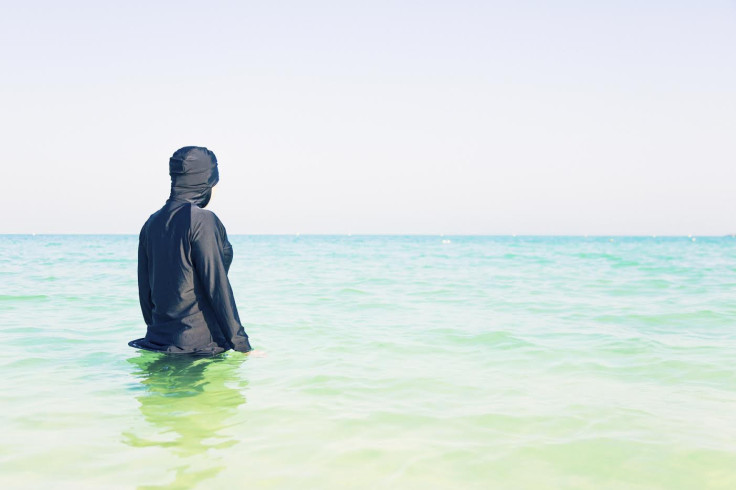The burkini is sexist - but ban women from wearing it and we're no better than a dictatorship
This decision mirrors the tactic of Islamic theocratic regimes' morality police.
From Syria to France, Muslim women are taking off their religious body coverage. In the Syrian town of Manbij, women are taking to the streets to burn the burqas that they were forced to wear by Isis terrorists, whom recently lost control over the city. They ripped off their black clothes that were forced upon them as flags of radical political views, clothes that claim it is shameful to be a woman, and that a woman's value comes from her modesty.
Meanwhile, in France, Muslim women are removing their new fashion beach apparel, the "burkini" (the swim wear version of burqa). But this is not out of happiness for obtaining freedom, but by order of law. Three cities in France have recently banned full body swimsuits worn by some Muslim women on public beaches in Cannes, Villeneuve-Loubet and a Corsican resort, Sisco.
Following the horrific terrorist attacks committed in France, including the massacre of 85 people on the seafront of Nice on the 14 July, tensions have grown this summer between the Muslim community and other locals in France. An apex was recently reached in Sisco as two groups clashed leaving five people injured, apparently because some tourists were taking pictures of a group of women wearing burkinis.
The mayors of the cities enforcing the burkini ban claim that they are attempting to settle tensions and ensure that both sides benefit from this decision.
France, with its deep-rooted tradition of secularism, already forbids by law the wearing of religious symbols in schools and state institutions, which has proven to have significantly positive results on education and in social interactions between children and adults. The Islamic burqa and niqab, as well as other face coverage, has been forbidden in public space since 2004, which is totally justified by security measures and does not appear to have had any negative results. The latest bans of burkinis for women on beaches, however, is a fatal failure for France and its secularism.
Despite the fact I am against the burqa, niqab, hijab, and religious dress codes for women, I don't think the burkini ban is justified. Moreover, it is damaging.
Attempting to ban a fundamentalist idea by law will not lead to progress of secularism and unity in society, but will only once again reinforce the right-wing minds who only seek divisions.
When the socialist mayor of Sisco, Ange-Pierre Vivoni, explained that the reason behind this decision is to get rid of "Islamist fundamentalism" in Corsica, he misses an important point. I don't disagree that the burqa and burkini are signs of an Islamic fundamentalism, as women are forced by law to cover their heads and bodies in some Muslim countries. Historically, the idea of women covering their bodies is enforced when Islam begins to play a role in the political sphere, such as in Iran after the 1979 revolution, Afghanistan and Pakistan with the Taliban, and Egypt with the Muslim Brotherhood.
Islamic body coverage for women is well promoted in the Quran, even though the head coverage is not mentioned. For that reason, the burqa and burkini are not clothes among others, but a symbol of a political patriarcho-religious ideology, a garment that marks women as different from men in society, and an instrument to hide what is perceived as shameful and property of a man.

There's an ideology behind these clothes, and this is why the French burkini ban is a failure. You can't ban an idea, a way of thinking. Attempting to ban a fundamentalist idea by law will not lead to the progress of secularism and unity in society, but will only once again reinforce the right-wing minds who only seek divisions.
Banning women from wearing a certain type of clothing for a private matter such as swimming, even though these clothes manifest a radical idea, is not a secular act, but a dictatorial one. This decision mirrors the tactic of Islamic theocratic regimes' "morality police" that patrol the streets making sure women are following an imposed dress code.
While a mandatory dress code in schools and state institutions is justified, clothes that people wear in their private life, in the streets or at the beach, cannot become a state matter. Therefore, despite my feminist hatred of the burqa, I believe that the French burkini ban is a failure. I am convinced that ideas can only be fought and destroyed by ideas, not by dictatorial bans.
France has to continue its secular progress through national education and public debates by efficiently identifying and opposing Islamic fundamentalism, along with its symbols and attributes. Moreover, liberals and those who are often dubbed the "regressive left" must change their cowardly attitude and stop denying the significance of religious covering for women, and finish naming it a choice or even a feminist sign.
We must all commit to intellectually honest debates that in the long run will erase the fundamentalist ideas from our minds and free our bodies from the "clothes of shame". We will not eliminate radical ideas from the streets by banning them, but by committing to a truly efficient political plan, with improved integration and educational measures.
We cannot allow ourselves to use the same dictatorial tactic as fundamentalists in the name of secularism and humanism; we have our own efficient tools. We cannot allow ourselves to forbid, ban, limit, but should rather expand, teach, debate, exchange, share.
Don't forbid an idea, fight against it with a better idea. Secularism is one of them.
© Copyright IBTimes 2025. All rights reserved.






















